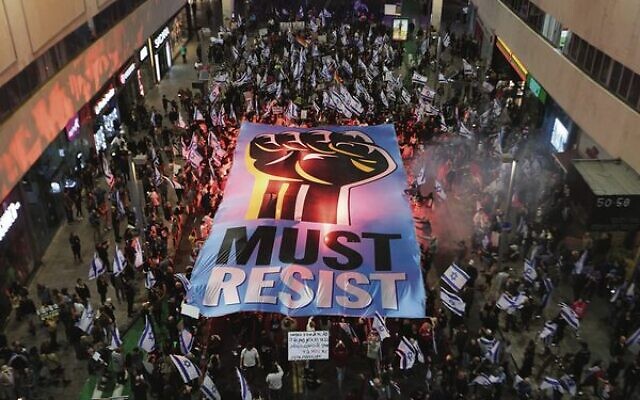As Zionists we have an obligation to speak up
As a Zionist stakeholder I can only join my concern with that of others as the Jewish world contends with the ramifications of the proposed reforms on Israel's democratic structures.

‘Schver tz’zayin a yid” (It’s hard to be a Jew) my friend Jeff constantly reminds me. Well, lately, it’s been pretty tough being a Zionist too.
According to JCA and Monash University’s Gen17 survey that is somewhere between about 70 and 90 per cent of us, so I’m sure I’m not alone. In the last nine weeks we have seen hundreds of thousands of Israelis espousing their raging opposition to the judicial reforms proposed by the Netanyahu government that, in the views of many, imperil Israel’s democracy.
We have seen a visit by a former Israeli PM who considers the growing divide those reforms are creating as the principal existential threat facing the Jewish state today. While in Adelaide, we watch with horror as a mainstream arts festival doubled down on its decision to platform unabashed antisemites.
We have also seen record attendances across the country at the United Israel Appeal’s gala events. Glen Eira Council in Melbourne has chosen to celebrate Israel’s 75th anniversary by dedicating a peace garden; and within six weeks, the University of Melbourne and Monash University have both adopted the IHRA Working Definition of Antisemitism. Quite the mixed Zionist bag of late.
There are always highs and lows that characterise the Diaspora’s relationship with Israel – the features of which a community personality described to me recently as “unconditional, but not uncritical love”.
While we neither vote in Israeli elections, serve in the IDF nor pay taxes in Israel, there is an imperative for the voice of the Diaspora to be heard across the Jewish world – including Israel, which is after all the praxis of the Zionist project. In that sense, we are all stakeholders (as opposed to participants) in what happens in and to the Jewish state.
As a Zionist stakeholder I can only join my concern with that of others as the Jewish world contends with the ramifications of the proposed reforms on Israel’s democratic structures.
The Zionist movement has always been pluralistic, inclusive and democratic – these values are enshrined in our foundation document, the Jerusalem Program, and also reflected in Israel’s Declaration of Independence, which guarantees “… complete equality of social and political rights to all [Israel’s] inhabitants irrespective of religion, race or sex”. And when those rights are under question – as they sadly are today – then as Zionists we have an obligation to speak up.
Indeed, it would be remiss of anyone who claims and feels a connection with Israel to not express their concerns (and yes, it is also incumbent on those who support the thrust of the current reforms to air their views too).
We are a robust and relatively healthy Jewish community – vibrant discussions and sharing of views can only enhance our strength and our bond with Israel. In PR circles it is said that the only thing worse than being talked about is not being talked about, and the same is true for Zionism in the Diaspora.
Disengagement from Israel imperils our Zionist community. I firmly believe that the stronger our connection with Israel, the stronger we are as a Jewish community. Gathering at a local park to protest the proposed reforms is engagement with the Jewish state. Advocating for the judicial reforms is engagement with the Jewish state. Going to shule and quietly praying for peace in Israel is also engagement, as is talking to friends either in-person or online.
This is the time when we need to find our voice, not ignore or silence it. We need vigorous debate that reflects our commitment to Israel and allows for the many opinions that make up our community to surface.
This isn’t a passive exercise. It requires active involvement. We need to condemn the barbaric behaviour that terrorised the West Bank village of Huwara and the Israeli minister who called for that village to be “wiped out”. We need to support all members of our community so their critically important sentiments can be heard, and we must encourage inclusive discussion that respectfully ensures that the plurality of positions are represented.
That is why I wholeheartedly support this week’s joint statement issued by the Zionist Federation of Australia and the Executive Council of Australian Jewry, and will be advocating for its endorsement by Zionism Victoria’s executive when it meets next week.
Beyond critical and supportive discourse, the secret ingredient that defines our relationship with Zionism and Israel, is of course love. Love for the Jewish state, love for the Jewish people and love for the eternal centre and focus of our Jewish lives – whether they take place in Sydney or Melbourne, or Tel Aviv, New York or Efrat.
Next month at Israel’s 75th birthday, let’s join together as a community that encourages strong opinions and find the common voice that binds us together more than any other – our love for Israel and our eternal hope to be “… a free people in our land, the land of Zion and Jerusalem”.
Yossi Goldfarb is the president of Zionism Victoria.

comments